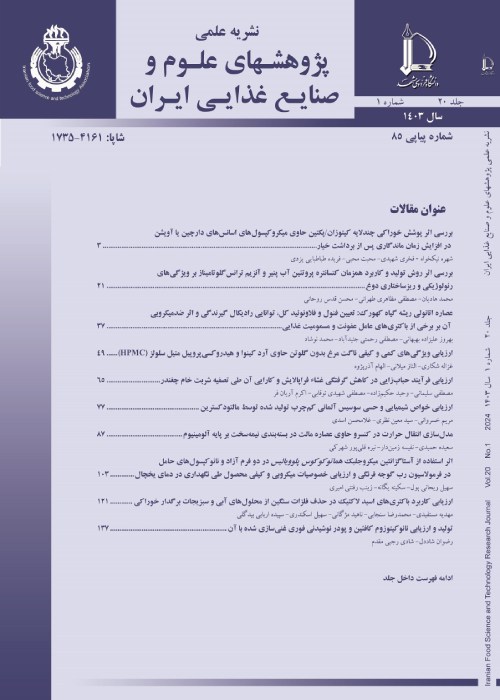Rheological properties of Liquorice (Glycyrrhiza glabra) extract
Author(s):
Abstract:
Introduction
Liquorice (Glycyrrhiza glabra) of the family Leguminosae is a 30±60 cm tall shrub having blue or violet flowers. Its roots are 15±20 cm long and have a cylindrical rod shape of 0.5±2.5 cm in diameter. Liquorice root contains a variety of compounds, the most prominent of which is the water soluble triterpenoid glycoside glycyrrhizin that constitutes about 16 %. It is responsible for the characteristic sweet taste of liquorice (50 times sweeter than sucrose). The root also contains various sugars (to 18%), flavonoids, saponoids, sterols, starches, amino acids, gums, and essential oil. The water extract of liquorice root has found wide uses in medicine, pharmacology and food industry because of its physical and functional properties.In the food industry, its distinctive flavour makes it a popular sweetening/flavouring agent. It is also used as an emulsifier to create foam in drinks and beverages. Liquorice root extract is commonly consumed and marketed in liquid, concentrated, dry and powdered forms.
Knowledge of the flow (rheological) behavior of the concentrates is useful in quality control, sensory evaluation and engineering applications that are related to the proper design and operation of unit operations, as well as for the understanding of the pertinent transport processes in the operations.
The purpose of this investigation was to characterize the rheological behavior of liquorice extract concentrates and study the effect of temperature and soluble solids on the viscosity.
Materials And Methods
Extraction was made at 50°C and water to liquorice root mass ratio of 4:1. The mixture was shaken continuously for 100 min, centrifuged for 10 min and then filtered to obtain a clarified extract, which was concentrated to 50°Brix in a laboratory rotary vacuum evaporator.The rheological behavior of licorice extract has been studied at temperature range 10-70 0C and 5-50 % soluble solids using Brookfield viscometer.
Results And Discussion
The obtained results showed that all the samples exhibited Newtonian behavior at all the studied temperatures and concentrations. The flow index decreased slightly with sample concentration. Several workers observed Newtonian behavior of clarified and depectinated juices.The shear stress versus shear rate data obtained were well fitted to Newton's model. An increase in temperature decreased the viscosity and this inverse relationship has been likened to the incidence of a freer molecule to molecule interaction at elevated temperatures. Since viscosity is an indication of the resistance to flow such a freer interaction is expected to minimize the resistance.
It was observed that, irrespective of the temperature a decrease in soluble solids content decreased the viscosity. It is due to dilution which increases the separation between the particles, thus decreases interaction between the particles.
In contrast, the opposite effect was observed when soluble solids content became higher. Arrhenius type equation was found to be suitable in describing the relationship with correlation coefficient values between 0.94 and 0.99. The activation energy increased with the soluble solids content; therefore, temperature had a greater effect on samples with higher soluble solids content. The data obtained in this study can be used in designing equipment for handling of concentrated liquorice root extract at the temperature range studied.
Keywords:
Language:
Persian
Published:
Iranian Food Science and Technology Research Journal, Volume:12 Issue: 1, 2016
Pages:
193 to 200
magiran.com/p1576610
دانلود و مطالعه متن این مقاله با یکی از روشهای زیر امکان پذیر است:
اشتراک شخصی
با عضویت و پرداخت آنلاین حق اشتراک یکساله به مبلغ 1,390,000ريال میتوانید 70 عنوان مطلب دانلود کنید!
اشتراک سازمانی
به کتابخانه دانشگاه یا محل کار خود پیشنهاد کنید تا اشتراک سازمانی این پایگاه را برای دسترسی نامحدود همه کاربران به متن مطالب تهیه نمایند!
توجه!
- حق عضویت دریافتی صرف حمایت از نشریات عضو و نگهداری، تکمیل و توسعه مگیران میشود.
- پرداخت حق اشتراک و دانلود مقالات اجازه بازنشر آن در سایر رسانههای چاپی و دیجیتال را به کاربر نمیدهد.
دسترسی سراسری کاربران دانشگاه پیام نور!
اعضای هیئت علمی و دانشجویان دانشگاه پیام نور در سراسر کشور، در صورت ثبت نام با ایمیل دانشگاهی، تا پایان فروردین ماه 1403 به مقالات سایت دسترسی خواهند داشت!
In order to view content subscription is required
Personal subscription
Subscribe magiran.com for 70 € euros via PayPal and download 70 articles during a year.
Organization subscription
Please contact us to subscribe your university or library for unlimited access!


